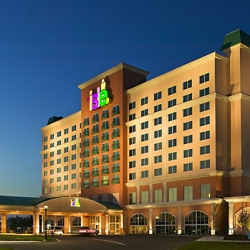
The Isle of Capri in Waterloo, about 50 miles away, would have been affected by a Cedar Rapids casino.
The Iowa Supreme Court ruled this week that gaming regulators have the right to consider the economic impact of awarding new gambling licenses. Iowa’s high court stated that the state has no automatic requirement to issue a casino license when a county wants one.
The ruling might sound like common sense, but that was the decision which faced the Iowa Supreme Court justices after a Cedar Rapids lawyer sued the Iowa Racing and Gaming Commission. The lawsuit stemmed from a 2014 decision to reject Cedar Rapids’ application for a casino license.
Iowa Racing & Gaming Commission Lawsuit
The lawyer who sued the Racing & Gaming Commission was Eugene Kopecky. Mr. Kopecky argued that the gaming commission is required to approve a license after a county’s voters pass a refendum on the issue. Kopecky said that the commission’s reasons for denying the application — the broader economic impact on already-existing casinos — should not have affected their decision.
In the decision, the Iowa Supreme Court ruled that the Racing and Gaming Commission is under no obligation to issue a license when a county refeendum passes. The court’s justices referred to the gaming legislation passed by Iowa lawmakers, which said the IRGC “may” issue a license — not “must” or “shall” issue that same license.
County Referendums Are Not Key
The court’s opinion read, “If the legislature intended to impose a duty on the commission to issue a license following an affirmative referendum, it would have used the word ‘shall,’ as it did to impose a duty on the commission to not issue a license to conduct gambling games in a county in which the majority of voters disapprove a referendum for gambling games.”
Had Eugene Kopecky’s interpretation of Iowa gambling laws been upheld by the court, it would have given county-level officials the ability to enact state-level decisions. The Iowa Supreme Court’s decision therefore assured that legislative chaos did not happen, whether with the specific issue of gambling law or with statewide laws on a broader range of issues.
Economic Impact Matters
The Iowa Supreme Court rejected the second half of Eugene Kopecky’s argument, too. Kopecky argued that economic impact should have have an effect on regulators’ decisions to approve or reject an application for a Cedar Rapids casino. Mr. Kopecky believed that the economic well-being of counties which have casinos already should not factor into the IRGC’s decision any more than the economic well-being of counties without casinos. In effect, Kopecky argued that such considerations are discriminatory and unfair.
The court ruled that economics “is an important function of legalized gambling“.
The justices cited the fact that the legislature stipulated that at least 3% of gross revenues should be returned to the local communities is an indication that lawmakers believe the economic impact of casinos is important. In the court’s opinion, the very reason a state allows such gaming is to help rural communities generate revenue, while helping the state fill its coffers. Economics is therefore a key factor in licensing decisions.
IRGC Should Insure Economic Development
In its opinion, the court stated, “In order to insure the continued economic development of our state, the legislature and the commission deem it important to make sure an existing gambling facility remains viable when the commission issues a new license. A closed gambling facility, together with a loss of jobs, has an adverse effect on economic development in our state.”
It hardly helps to open a new casino, if that costs jobs in another county. In its own way, that is the government picking winners and losers. Even more so, it is wasteful to build a new casino if that means a second casino closes down. Development costs investors hundreds of millions of dollars in a state like Iowa, so those development costs should not go for naught. Under Eugene Kopecky’s system, casinos might be built in a string of adjacent counties, leading all the gaming venues to fail.
In other states such as New Jersey and Mississippi, market saturation has caused the closure of casinos. The same economic factors have caused well-established casinos like Mohegan Sun and Foxwoods to incur billions of dollars worth of debt. In Connecticut, the building of brick-and-mortar casinos in Massachusetts, New York, and Rhode Island means that gamblers across the region are less likely to visit the Connecticut tribal casinos. Combined with the bad luck of the Global Recession and bad planning in the form of billion-dollar expansions just prior to the recession, some of the biggest casinos in the world have faced significant economic problems.
